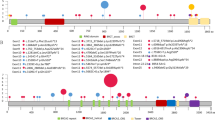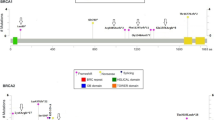Abstract
Purpose
Cell-cycle-checkpoint kinase 2 (CHEK2) is an important moderate-penetrance breast cancer predisposition gene; however, recurrent CHEK2 mutations found in Caucasian women are very rare in Chinese population. We investigated the mutation spectrum and clinical relevance of CHEK2 germline mutations in Chinese breast cancer patients.
Methods
The entire coding regions and splicing sites of CHEK2 were screened in 7657 Chinese BRCA1/2-negative breast cancer patients, using 62-gene panel-based sequencing.
Results
Out of 7657 BRCA1/2-negative breast cancer patients, 26 (0.34%) carried CHEK2 pathogenic germline mutations. Most of these mutations (92.3%, 24/26) were nonsense or frameshift mutations; 84.6% (22/26) of them were in forkhead-associated (FHA) or kinase domains. Of the 18 types of CHEK2 mutations we found, 61.1% (11/18) of were novel mutations and two recurrent mutations (Y139X and R137X) were found in this cohort. Patients with CHEK2 mutations were significantly more likely to have family histories of breast and/or ovarian cancer (23.1% vs. 8.6%, p = 0.022) and family histories of any cancer (50.0% vs. 31.6%, p = 0.044); and were significantly more likely to have lymph node-positive (53.8% vs. 27.3%, p = 0.002) and progesterone receptor (PR)-positive (88.5% vs. 64.5%, p = 0.011) breast cancers.
Conclusions
Among Chinese breast cancer patients, the CHEK2 germline mutation rate is approximately 0.34% and two specific mutations (Y139X and R137X) are recurrent. Patients with CHEK2 mutations are significantly more likely to have family histories of cancer, and to develop lymph node-positive and/or PR-positive breast cancers.


Similar content being viewed by others
References
Bartek J, Falck J, Lukas J (2001) CHK2 kinase–a busy messenger. Nat Rev Mol Cell Biol 2(12):877–886. https://doi.org/10.1038/35103059
Bartek J, Lukas J (2003) Chk1 and Chk2 kinases in checkpoint control and cancer. Cancer Cell 3(5):421–429
Antoni L, Sodha N, Collins I et al (2007) CHK2 kinase: cancer susceptibility and cancer therapy—two sides of the same coin? Nat Rev Cancer 7(12):925–936. https://doi.org/10.1038/nrc2251
Cybulski C, Wokolorczyk D, Jakubowska A et al (2011) Risk of breast cancer in women with a CHEK2 mutation with and without a family history of breast cancer. J Clin Oncol 29(28):3747–3752. https://doi.org/10.1200/jco.2010.34.0778
Weischer M, Bojesen SE, Ellervik C et al (2008) CHEK2*1100delC genotyping for clinical assessment of breast cancer risk: meta-analyses of 26,000 patient cases and 27,000 controls. J Clin Oncol 26(4):542–548. https://doi.org/10.1200/jco.2007.12.5922
Daly MB, Pilarski R, Berry M et al. (2017) NCCN Clinical practice guidelines in oncology. In: Genetic/Familial high-risk assessment: breast and ovarian version1.2018. Accessed 14 Nov 2017
Choi DH, Cho DY, Lee MH et al (2008) The CHEK2 1100delC mutation is not present in Korean patients with breast cancer cases tested for BRCA1 and BRCA2 mutation. Breast Cancer Res Treat 112(3):569–573. https://doi.org/10.1007/s10549-007-9878-z
Liu Y, Liao J, Xu Y et al (2011) A recurrent CHEK2 p. H371Y mutation is associated with breast cancer risk in Chinese women. Hum Mutat 32(9):1000–1003. https://doi.org/10.1002/humu.21538
Mohamad S, Isa NM, Muhammad R et al (2015) Low prevalence of CHEK2 gene mutations in multiethnic cohorts of breast cancer patients in Malaysia. PLoS ONE 10(1):e0117104. https://doi.org/10.1371/journal.pone.0117104
Thirthagiri E, Cheong LS, Yip CH et al (2009) CHEK2*1100delC does not contribute to risk to breast cancer among Malay, Chinese and Indians in Malaysia. Fam Cancer 8(4):355–358. https://doi.org/10.1007/s10689-009-9244-x
Meijers-Heijboer H, van den Ouweland A, Klijn J et al (2002) Low-penetrance susceptibility to breast cancer due to CHEK2(*)1100delC in noncarriers of BRCA1 or BRCA2 mutations. Nat Genet 31(1):55–59. https://doi.org/10.1038/ng879
Weischer M, Bojesen SE, Tybjaerg-Hansen A et al (2007) Increased risk of breast cancer associated with CHEK2*1100delC. J Clin Oncol 25(1):57–63. https://doi.org/10.1200/jco.2005.05.5160
de Bock GH, Schutte M, Krol-Warmerdam EM et al (2004) Tumour characteristics and prognosis of breast cancer patients carrying the germline CHEK2*1100delC variant. J Med Genet 41(10):731–735. https://doi.org/10.1136/jmg.2004.019737
Cybulski C, Gorski B, Huzarski T et al (2006) CHEK2-positive breast cancers in young Polish women. Clin Cancer Res 12(16):4832–4835. https://doi.org/10.1158/1078-0432.ccr-06-0158
Cybulski C, Gorski B, Huzarski T et al (2004) CHEK2 is a multiorgan cancer susceptibility gene. Am J Hum Genet 75(6):1131–1135. https://doi.org/10.1086/426403
Nevanlinna H, Bartek J (2006) The CHEK2 gene and inherited breast cancer susceptibility. Oncogene 25(43):5912–5919. https://doi.org/10.1038/sj.onc.1209877
Kilpivaara O, Vahteristo P, Falck J et al (2004) CHEK2 variant I157T may be associated with increased breast cancer risk. Int J Cancer 111(4):543–547. https://doi.org/10.1002/ijc.20299
Shaag A, Walsh T, Renbaum P et al (2005) Functional and genomic approaches reveal an ancient CHEK2 allele associated with breast cancer in the Ashkenazi Jewish population. Hum Mol Genet 14(4):555–563. https://doi.org/10.1093/hmg/ddi052
Walsh T, Mandell JB, Norquist BM et al (2017) Genetic predisposition to breast cancer due to mutations other than BRCA1 and BRCA2 founder Alleles among Ashkenazi Jewish Women. JAMA Oncol. https://doi.org/10.1001/jamaoncol.2017.1996
Chen W, Yurong S, Liansheng N (2008) Breast cancer low-penetrance allele 1100delC in the CHEK2 gene: not present in the Chinese familial breast cancer population. Adv Ther 25(5):496–501. https://doi.org/10.1007/s12325-008-0057-3
Song CG, Hu Z, Yuan WT et al (2006) CHEK2 c.1100delC may not contribute to genetic background of hereditary breast cancer from Shanghai of China. Zhonghua yi xue yi chuan xue za zhi = Zhonghua yixue yichuanxue zazhi = Chinese. J Med Genet 23(4):443–445
Wang N, Ding H, Liu C et al (2015) A novel recurrent CHEK2 Y390C mutation identified in high-risk Chinese breast cancer patients impairs its activity and is associated with increased breast cancer risk. Oncogene 34(40):5198–5205. https://doi.org/10.1038/onc.2014.443
Xie Y, Li G, Chen M et al (2017) Mutation screening of 10 cancer susceptibility genes in unselected breast cancer patients. Clin Genet. https://doi.org/10.1111/cge.13063
Sun J, Meng H, Yao L et al (2017) Germline mutations in cancer susceptibility genes in a large series of unselected breast cancer patients. Clin Cancer Res. https://doi.org/10.1158/1078-0432.ccr-16-3227
Yao L, Sun J, Zhang J et al (2016) Breast cancer risk in Chinese women with BRCA1 or BRCA2 mutations. Breast Cancer Research Treat 156(3):441–445. https://doi.org/10.1007/s10549-016-3766-3
Richards S, Aziz N, Bale S et al (2015) Standards and guidelines for the interpretation of sequence variants: a joint consensus recommendation of the American college of medical genetics and genomics and the association for molecular pathology. Genet Med 17(5):405–424. https://doi.org/10.1038/gim.2015.30
Roeb W, Higgins J, King MC (2012) Response to DNA damage of CHEK2 missense mutations in familial breast cancer. Hum Mol Genet 21(12):2738–2744. https://doi.org/10.1093/hmg/dds101
Schwarz JK, Lovly CM, Piwnica-Worms H (2003) Regulation of the Chk2 protein kinase by oligomerization-mediated cis- and trans-phosphorylation. Mol Cancer Res 1(8):598–609
Desrichard A, Bidet Y, Uhrhammer N et al (2011) CHEK2 contribution to hereditary breast cancer in non-BRCA families. Breast Cancer Res 13(6):R119. https://doi.org/10.1186/bcr3062
Falck J, Mailand N, Syljuasen RG et al (2001) The ATM-Chk2-Cdc25A checkpoint pathway guards against radioresistant DNA synthesis. Nature 410(6830):842–847. https://doi.org/10.1038/35071124
Falck J, Lukas C, Protopopova M et al (2001) Functional impact of concomitant versus alternative defects in the Chk2-p53 tumour suppressor pathway. Oncogene 20(39):5503–5510. https://doi.org/10.1038/sj.onc.1204811
Decker B, Allen J, Luccarini C et al (2017) Rare, protein-truncating variants in ATM, CHEK2 and PALB2, but not XRCC2, are associated with increased breast cancer risks. J Med Genet. https://doi.org/10.1136/jmedgenet-2017-104588
Leedom TP, LaDuca H, McFarland R et al (2016) Breast cancer risk is similar for CHEK2 founder and non-founder mutation carriers. Cancer Genet 209(9):403–407. https://doi.org/10.1016/j.cancergen.2016.08.005
Buys SS, Sandbach JF, Gammon A et al (2017) A study of over 35,000 women with breast cancer tested with a 25-gene panel of hereditary cancer genes. Cancer 123(10):1721–1730. https://doi.org/10.1002/cncr.30498
Couch FJ, Shimelis H, Hu C et al (2017) Associations between cancer predisposition testing panel genes and breast cancer. JAMA Oncol 3(9):1190–1196. https://doi.org/10.1001/jamaoncol.2017.0424
Hallamies S, Pelttari LM, Poikonen-Saksela P et al (2017) CHEK2 c.1100delC mutation is associated with an increased risk for male breast cancer in finnish patient population. BMC Cancer 17(1):620. https://doi.org/10.1186/s12885-017-3631-8
Wasielewski M, den Bakker MA, van den Ouweland A et al (2009) CHEK2 1100delC and male breast cancer in the Netherlands. Breast Cancer Res Treat 116(2):397–400. https://doi.org/10.1007/s10549-008-0162-7
Naslund-Koch C, Nordestgaard BG, Bojesen SE (2016) Increased risk for other cancers in addition to breast cancer for CHEK2*1100delC heterozygotes estimated From the copenhagen general population study. J Clin Oncol 34(11):1208–1216. https://doi.org/10.1200/jco.2015.63.3594
Weischer M, Nordestgaard BG, Pharoah P et al (2012) CHEK2*1100delC heterozygosity in women with breast cancer associated with early death, breast cancer-specific death, and increased risk of a second breast cancer. J Clin Oncol 30(35):4308–4316. https://doi.org/10.1200/jco.2012.42.7336
Huszno J, Budryk M, Kolosza Z et al (2016) A comparison between CHEK2*1100delC/I157T mutation carrier and noncarrier breast cancer patients: a clinicopathological analysis. Oncol 90(4):193–198. https://doi.org/10.1159/000444326
Schmidt MK, Hogervorst F, van Hien R et al (2016) Age- and Tumor Subtype-Specific Breast Cancer Risk Estimates for CHEK2*1100delC Carriers. J Clin Oncol 34(23):2750–2760. https://doi.org/10.1200/jco.2016.66.5844
Nagel JH, Peeters JK, Smid M et al (2012) Gene expression profiling assigns CHEK2 1100delC breast cancers to the luminal intrinsic subtypes. Breast Cancer Res Treat 132(2):439–448. https://doi.org/10.1007/s10549-011-1588-x
Baloch AH, Khosa AN, Bangulzai N et al (2016) Novel Nonsense Variants c.58C>T (p. Q20X) and c.256G>T (p.E85X) in the CHEK2 Gene Identified dentified in Breast Cancer Patients from Balochistan. Asian Pac J Cancer Prev 17(3):1089–1092
Susswein LR, Marshall ML, Nusbaum R et al (2016) Pathogenic and likely pathogenic variant prevalence among the first 10,000 patients referred for next-generation cancer panel testing. Genet Med 18(8):823–832. https://doi.org/10.1038/gim.2015.166
Friedrichsen DM, Malone KE, Doody DR et al (2004) Frequency of CHEK2 mutations in a population based, case-control study of breast cancer in young women. Breast Cancer Res 6(6):R629–635. https://doi.org/10.1186/bcr933
Sodha N, Mantoni TS, Tavtigian SV et al (2006) Rare germ line CHEK2 variants identified in breast cancer families encode proteins that show impaired activation. Cancer Res 66(18):8966–8970. https://doi.org/10.1158/0008-5472.can-06-1990
Tung N, Lin NU, Kidd J et al (2016) Frequency of Germline mutations in 25 cancer susceptibility genes in a sequential series of patients with breast cancer. J Clin Oncol 34(13):1460–1468. https://doi.org/10.1200/jco.2015.65.0747
Acknowledgments
This study was supported by the National Natural Science Foundation of China (81372832 and 81202107), the National Science and Technology Support Program (2014BAI09B08), and the 973 project (2013CB911004).
Author information
Authors and Affiliations
Corresponding authors
Ethics declarations
Conflicts of interest
The authors declare that they have no conflict of interest.
Electronic supplementary material
Below is the link to the electronic supplementary material.
Rights and permissions
About this article
Cite this article
Fan, Z., Ouyang, T., Li, J. et al. Identification and analysis of CHEK2 germline mutations in Chinese BRCA1/2-negative breast cancer patients. Breast Cancer Res Treat 169, 59–67 (2018). https://doi.org/10.1007/s10549-018-4673-6
Received:
Accepted:
Published:
Issue Date:
DOI: https://doi.org/10.1007/s10549-018-4673-6




